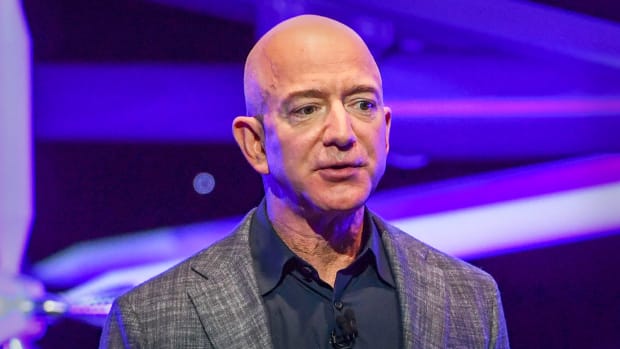The space race between Amazon (AMZN) founder Jeff Bezos and Tesla (TSLA) CEO Elon Musk is tighter than the wealth race between the two.
There aren't many rivals when your reported net worth is in the twelve-figure range, so the budding rivalry between two of history's wealthiest figures seems natural.
Musk overtook Bezos as the world's richest person last year, and his current $288 billion net worth puts him well ahead of Bezos' $193 billion net worth, according to the Bloomberg Billionaire Index.
Bezos has also stepped down as CEO of Amazon, so the chances that he catches Musk, whose wealth is set to grow immensely and Tesla hits its inflection point, are thin.
But Bezos can catch Musk in space, and Bezos' Blue Origin space exploration company is getting closer to winning the space race between the two, with a little turbo boost from Amazon.

Jonathan Newton / The Washington Post via Getty Images
Blue Origin Get Private Contract Boost
On Tuesday, Amazon announced agreements with Blue Origin, Arianespace and United Launch Alliance to provide launch services for Project Kuiper, Amazon's internet space initiative.
Blue Origin will help with Amazon's plan to build a network of 3,236 satellites in low Earth orbit in order to provide global internet service.
Project Kuiper is similar to SpaceX's own Starlink program, which has a plan for tens of thousands of small satellites to provide broadband internet.
United Launch Alliance has the largest contract with Amazon, with 38 launches contracted to the company.
Blue Origin has an agreement for 12 launches with options for up to 15 additional launches.
Arianespace will launch 18 missions with Amazon payload.
Starlink is well ahead of Project Kuiper currently, with more than 2,000 satellites already in orbit and 250,000 subscribers globally. Amazon's version has yet to launch any satellites.
"These launch agreements reflect our incredible commitment and belief in Project Kuiper, and we’re proud to be working with such an impressive lineup of partners to deliver on our mission," Dave Limp, senior vice president for Amazon services, said.
Amazon didn't give all of its launch contracts to Blue Origin and the companies says the multiple service provider strategy reduces the risks associated with the rocket launches and lowers the costs for Amazon.
Blue Origin's Prospects Are Rising
In March, NASA said it planned a second commercial project to develop a moon landing system to carry astronauts to and from the lunar surface.
"Competition is critical to our success on the lunar surface and beyond, ensuring we have the capability to carry out a cadence of missions over the next decade," NASA Administrator Bill Nelson said in a statement.
A Blue Origin spokesperson said the company "is thrilled that NASA is creating competition by procuring a second human lunar landing system."
"By doing so, NASA will establish the critical redundancy and robustness needed for establishing permanent U.S. lunar presence," the spokesperson said. "Blue Origin is ready to compete and remains deeply committed to the success of Artemis."
Blue Origin will look to mend its relationship with NASA after Blue Origin and Dynetics of Huntsville, Ala., filed a protest last year with the U.S. Government Accountability Office after NASA awarded a $2.9 billion lunar landing system contract to SpaceX.







